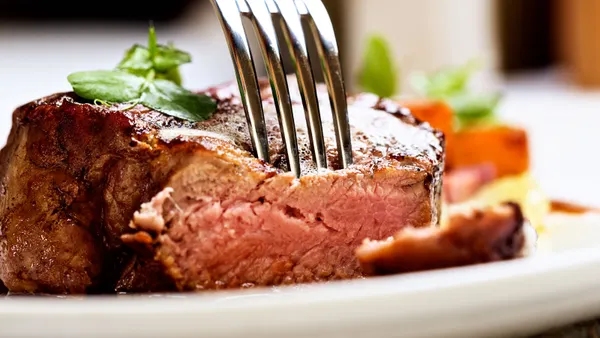UPDATE: March 6, 2020: The food safety law form Ron Simons & Associates and co-counsel Hammer Law Firm have filed a lawsuit regarding E. coli contaminated sandwiches sold at Jimmy John's locations in Iowa, according to a press release. The lawsuit was filed on behalf of Kahler Folkedahl, who visited a Jimmy John's restaurant in Iowa in November and endured symptoms of E. coli poisoning that was later linked to the consumption of contaminated sprouts that were sold at Jimmy John's locations. The Iowa Department of Public Health linked 22 people that had been infected with E. coli to sandwiches consumed at Jimmy John's.
UPDATE: Feb. 26, 2020: This article has been updated to include a statement from Jimmy John's.
Dive Brief:
- The FDA sent a warning letter to Jimmy John’s last week that claims the sandwich shop has a pattern of selling sandwiches with contaminated vegetables, providing evidence detailing five foodborne illness outbreaks at the chain dating back to 2012.
- Those outbreaks included salmonella and E. Coli, according to the letter, with the most recent outbreak happening in December. In total, about 90 people have been affected.
- The FDA's letter states: "The evidence demonstrates that your corporation, through your franchised Jimmy John’s restaurants, engaged in a pattern of receiving and offering for sale adulterated fresh produce, specifically clover sprouts and cucumbers... Taken together, these outbreaks, which spanned over the past seven years and impacted no fewer than seventeen states demonstrate the corporate-wide supplier control mechanisms you have in place for receiving fresh produce are inadequate."
Dive Insight:
Jimmy John’s President James North told Restaurant Dive in a statement that the chain has removed sprouts from all of its restaurants. Sprouts are one of the biggest offenders when it comes to food poisoning. But so, too, are other Jimmy John’s ingredients, such as cucumbers and lettuce, so this move may not be enough to satisfy the FDA.
"Food safety is our top priority. Sprouts present particular challenges, given our unwavering commitment to world-class food safety standards. Therefore, we made the decision to permanently remove sprouts from all restaurants and acted swiftly to do so," North said. "As of Monday, February 24, sprouts are no longer being served in any restaurant, and they will remain out of our restaurants permanently."
Notably, as the FDA letter states, the chain has not put any additional processes in place to prevent further incidents.
The agency has specifically asked the chain to present how it will prevent receiving or selling such "adulterated" food at its restaurants. Failure to do so may result in consequences including seizure or injunction.
Without a plan in place, Jimmy John's can bank on a hit to its bottom line and reputation. The chain has already faced several food safety lawsuits. At least two were filed in 2012, when the outbreaks were first recorded. And in 2018, a Wisconsin woman sued after she tested positive for salmonella. According to a 2018 study by researchers at Johns Hopkins Bloomberg School of Public Health, a single foodborne illness can cost a fast food restaurant up to $2 million, which includes fines, lawsuits, lost revenue, inspection costs and staff training.
Operationally, Jimmy John's may have to change its procurement approach to satisfy the FDA's request. It could pull learnings from its sister chains, Sonic and Arby’s, at Inspire Brands and perhaps leverage those efficiencies.
Or it could tap into burgeoning technologies to solve the problem, as other brands have done. Chick-fil-A, for example, is using a customized artificial intelligence system that provides the company with algorithms to analyze social media posts for potential food safety issues across its system. The system has achieved nearly 80% accuracy.
After Chipotle's 2015 E. coli outbreak that sickened dozens of people and eroded the company’s stock, the chain deployed Zenput, a mobile platform that tracks operations to ensure no food safety steps are missed. Chipotle also started testing its entire workforce on food safety every quarter.
With the filing of a new lawsuit against Jimmy John's, its food safety issues aren't likely to go away anytime soon. Chipotle ended up settling claims with over 100 customers in 2016 who got sick at its restaurants to avoid the courtroom. This could be Jimmy John's strategy if more lawsuits follow, especially with FDA's widely publicized warning letter.
Jimmy John's plan is due to the FDA in 15 days, which is a tight turnaround for any organization, let alone a franchised organization that is 2,800-units strong. If it leans on the resources of its new parent company, it may be able to establish a new food safety standard that curbs these issues. Jimmy John's isn't alone in its food safety struggles, either — thought 82% of restaurant operators believe their stores are performing well on food safety protocols, about 1 in 5 are out of compliance with brand standards, according to Zenput and Technomic research. Thirty-six percent of operators also said it takes more than a week to address a food safety problem, and less than one in four believe they could solve a food safety issue within two days.








